
Salò, or the 120 Days of Sodom, billed on-screen as Pasolini's 120 Days of Sodom on English-language prints and commonly referred to as simply Salò, is a 1975 art horror film directed and co-written by Pier Paolo Pasolini. The film is a loose adaptation of the 1785 novel The 120 Days of Sodom by Marquis de Sade, updating the story's setting to the World War II era. It was Pasolini's final film, released three weeks after his murder.

Bernardo BertolucciOMRI was an Italian film director and screenwriter with a career that spanned 50 years. Considered one of the greatest directors in Italian cinema, Bertolucci's work achieved international acclaim. He was the first Italian filmmaker to win the Academy Award for Best Director for The Last Emperor (1987), one of many accolades including a BAFTA Award, a César Award, and two Golden Globes. He also received a Golden Lion in 2007, and a Honorary Palme d'Or in 2011.

The Gospel According to St. Matthew is a 1964 epic biblical drama film in the Italian neorealist style, written and directed by Pier Paolo Pasolini. It is a cinematic rendition of the story of Jesus according to the Gospel of Matthew, from the Nativity through the Resurrection.

Pier Paolo Pasolini was an Italian poet, film director, writer, screenwriter, actor and playwright. He is considered one of the defining public intellectuals in 20th-century Italian history, influential both as an artist and a political figure.

Nights of Cabiria is a 1957 drama film co-written and directed by Federico Fellini. It stars Giulietta Masina as Cabiria, a prostitute living in Rome. The cast also features François Périer and Amedeo Nazzari. The film is based on a story by Fellini, who expanded it into a screenplay along with his co-writers Ennio Flaiano, Tullio Pinelli and Pier Paolo Pasolini.

Teorema, also known as Theorem (UK), is a 1968 Italian allegorical film written and directed by Pier Paolo Pasolini and starring Terence Stamp, Laura Betti, Silvana Mangano, Massimo Girotti and Anne Wiazemsky. Pasolini's sixth film, it was the first time he worked primarily with professional actors. In this film, an upper-class Milanese family is introduced to, and then abandoned by, a divine force. Themes include the timelessness of divinity and the spiritual corruption of the bourgeoisie.
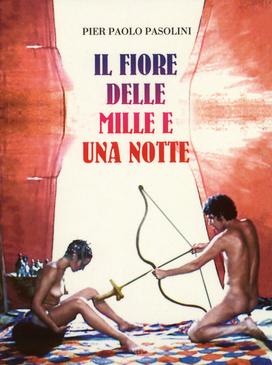
Arabian Nights is a 1974 Italian film directed by Pier Paolo Pasolini. Its original Italian title is Il fiore delle mille e una notte, which means The Flower of the One Thousand and One Nights.
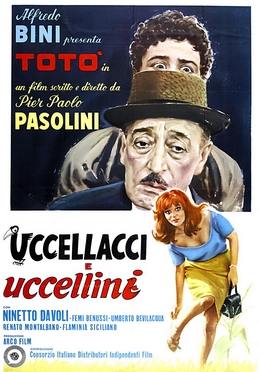
The Hawks and the Sparrows is a 1966 Italian film directed by Pier Paolo Pasolini. It was entered into the 1966 Cannes Film Festival where a "Special Mention" was made of Totò, for his acting performance.

Giovanni "Ninetto" Davoli is an Italian actor who became known through his roles in several of Pier Paolo Pasolini's films.

Ines Pellegrini is an Italian retired actress of Eritrean origin.
Adriano Bolzoni was an Italian journalist, writer and film director.
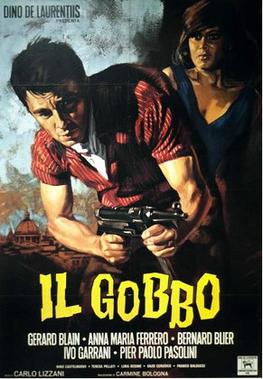
The Hunchback of Rome is a 1960 Italian crime-drama film directed by Carlo Lizzani. It is loosely based on the real life events of Giuseppe Albano, an Italian partisan that was involved in the Roman Resistance against German occupation between 1943 and 1945.
Sharon Hayes is an American multimedia artist. She came to prominence as an artist and an activist during the East Village scene in the early '90s. She primarily works with video, installation, and performance as her medium. Using multimedia, she "appropriates, rearranges, and remixes in order to revitalize spirits of dissent". Hayes's work addresses themes such as romantic love, activism, queer theory, and politics. She incorporates texts from found speeches, recordings, songs, letters, and her own writing into her practice that she describes as “a series of performatives rather than performance.”
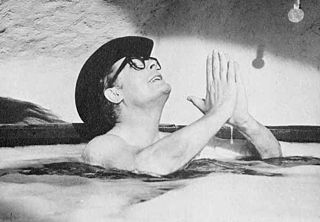
The list of the 100 Italian films to be saved was created with the aim to report "100 films that have changed the collective memory of the country between 1942 and 1978". Film preservation, or film restoration, describes a series of ongoing efforts among film historians, archivists, museums, cinematheques, and non-profit organizations to rescue decaying film stock and preserve the images they contain. In the widest sense, preservation assures that a movie will continue to exist in as close to its original form as possible.
The 25th annual Venice International Film Festival was held from 27 August to 10 September 1964.
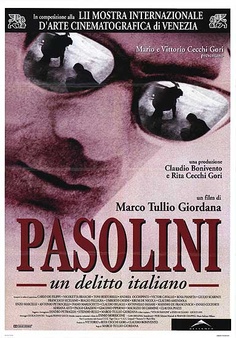
Pasolini, un delitto italiano, internationally released as Who Killed Pasolini?, is a 1995 Italian crime-drama film co-written and directed by Marco Tullio Giordana. It was released on 3 July 1996. It depicts the trial against Pino Pelosi, who was charged with the murder of artist and filmmaker Pier Paolo Pasolini.

Pasolini is a 2014 English-language internationally co-produced drama film directed by Abel Ferrara and written by Maurizio Braucci about the final days of Italian film director Pier Paolo Pasolini. It was selected to compete for the Golden Lion at the 71st Venice International Film Festival. It was also screened in the Special Presentations section of the 2014 Toronto International Film Festival.
Francesco Leonetti was an Italian poet, novelist, art critic, teacher and political activist.
Adele Cambria was an Italian journalist, writer and actress.
New Love Meetings is an Italian documentary film made on a Nokia N90, the first feature film shot entirely with a Camera phone. The film was inspired by Pier Paolo Pasolini's documentary Love Meetings and is a modern version of that film.














